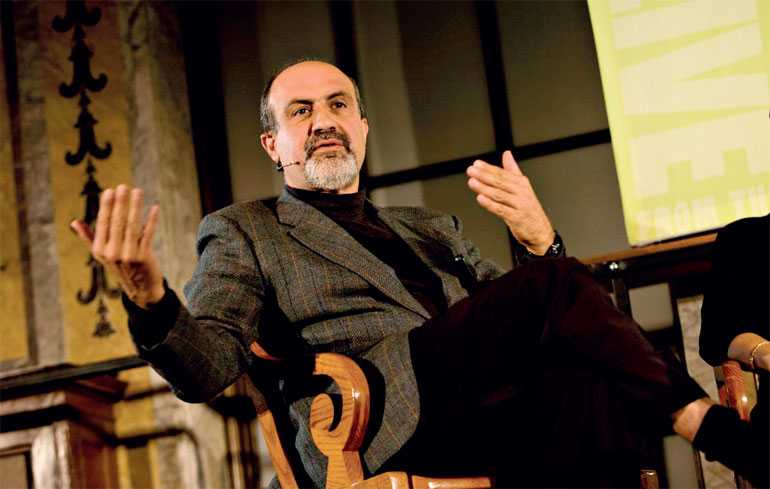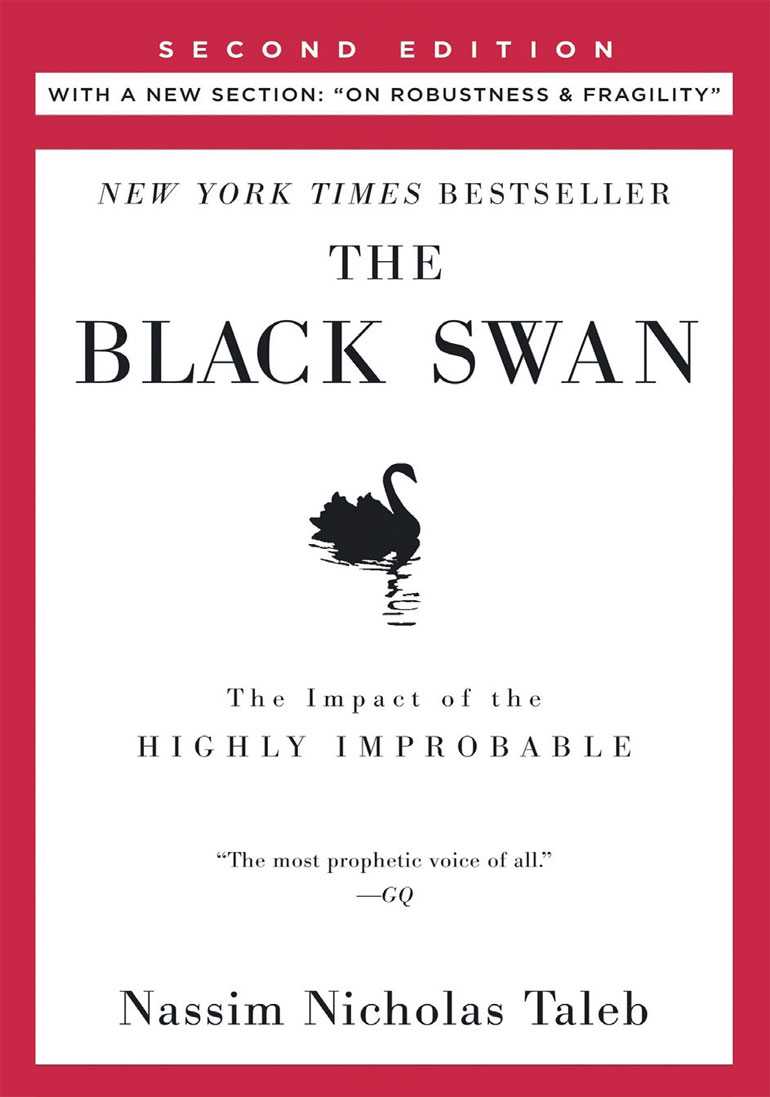Wednesday Feb 25, 2026
Wednesday Feb 25, 2026
Monday, 6 April 2020 00:30 - - {{hitsCtrl.values.hits}}

Nassim Taleb
Nassim Taleb’s prediction of an acute viral epidemic
The proponent of the Theory of Black Swan, Lebanese-American Essayist and New York University Academic, Nassim Taleb, has made a fine prediction in his third book in the Incerto Series, The Black Swan, which had gone unnoticed until today. In this book, first published in 2007, Taleb makes the following observation: ‘As we travel more on this planet, epidemics will be more acute – we will have a germ population dominated by a few numbers and the successful killer will spread vastly more effectively’. 
Taleb has made this observation as a side-line supportive argument to prove his main contention that Mother Nature disliked too much connectivity and globalisation, no matter whether it was biological, cultural or economic. This comes from the fact that larger environments can more easily be changed in size or scale than smaller ones. What this means is that bigger societies have a greater chance of becoming bigger, as the population of China or India would tell us. Hence, Mother Nature is bound to react angrily if it happens beyond tolerable limits.
Taleb’s critique of globalisation ran the risk of being misunderstood or misquoted by other interested parties. Hence, in the same book, he chooses to amplify his observation: ‘Once again I am not saying that we need to stop globalisation and prevent travel. We just need to be aware of the side effects – the trade-offs – and few people are’. Then, he converts his observation to a prediction: ‘I see the risk of a very strange acute virus spreading throughout the planet’. His contention was that a few people who carry this virus from place to place will infect all others and cause an acute and major epidemic throughout the planet.
Understanding COVID-19 through Taleb
It is natural that this prediction had gone unnoticed because it was a general observation without any timeline. The world takes notice of doomsday stories if they are accompanied by a timeline that may happen within the present generation’s life span. If it happens in many hundred years from the current period, it is simply ignored like the warnings about the catastrophic disasters associated with the climate changes.
But after the world has now been hit by COVID-19 which soon got upgraded from endemic to epidemic to pandemic, Taleb’s analysis contained in three books in the series, Antifragile, The Black Swan and Skin in the Game will help us to understand the present crisis better and suggest remedial measures.
Black Swans are no longer imaginary
The Theory of Black Swan has been central to the whole of the Incerto Series which Taleb has presented to readers over a time span of some 17 years. There is reference to it again and again in all the five books he has authored, namely, Fooled by Randomness, The Bed of Procrustes, The Black Swan, Antifragile, and Skin in the Game.
It should be so because the black swan had been thought only as an imagination for many millennia since the world had seen only white swans. Hence, in the Inductivistic scientific reasoning in which one should go on finding truth until a counter example is found in the field, the black swan was the exception: people had seen only white swans and hence it was thought that all swans were white; this was to be proved wrong only if one could see a black (or of any other colour) swan.
This became a reality when a team of Dutch explorers had found black swans in Western Australia in 1697. Since then, black swans were a common spectacle in many parts of the planet but still it is a rarity. Taking advantage of this, Taleb has conceptualised a Black Swan event if it meets with the following three requirements.
First, it should be a rare event difficult to be predicted, a kind of an outlier to the normal realm of people. Second, it should inflict an enormous impact on the world. Third, people become experts of the Black Swan event after it has occurred in hindsight. The present COVID-19 catastrophe meets with all these conditions and therefore, qualifies to be called a Black Swan event.
 Taleb: COVID-19 could have been avoided
Taleb: COVID-19 could have been avoided
However, Taleb in a series of recent interviews with the Bloomberg and the BBC Radio has opined that the present COVID-19 is not a Black Swan event but something like a white swan episode. His reasoning is again based on hindsight wisdom which is an integral part of the Black Swan Theory. His argument is that COVID-19 could have been avoided if the foreign travel from and into China was halted immediately after it became known that a new virus had hit the Wuhan Province of China, the original epicentre of the present coronavirus pandemic.
He has faulted the World Health Organisation, better known as WHO, for failing to diagnose the pandemic impact of the virus at the very beginning. When it was just an endemic confined to a particular province in China, if the borders to that province had been closed until the virus would have run its natural course, the spread of the virus throughout the globe could have been prevented.
But the endemic became an epidemic and epidemic became a pandemic within a matter of less than three months crippling the political, social, cultural and economic life of billions of people throughout the globe. But none in the world had this foresight at the beginning, including the Chinese authorities, and therefore, what has happened today has happened. Hence, in my view, COVID-19 is a Black Swan event and it has to be tackled in the way of tackling such an event.
Sri Lanka’s ailing economy
Sri Lanka’s already ailing economy was crippled beyond redemption by two Black Swan events that hit the country within the last 12-month period. The first was the Easter bombings of selected places of Christian worship and five-star hotels frequented by tourists in April 2019 by an extreme fundamentalist breakaway group of Islamic faith. It was an outlier, entailed a huge impact on political, cultural, economic and social life of Sri Lankans and everybody became experts of the Easter bombings only after it took place.
It caused religious discord of a permanent nature, completely crippled the once-booming tourism and hospitality sector, changed the government that was in power and inflicted an irreparable dent on the slow-progressing economy. This was evident when the full year economic results were announced by the country’s statistical bureau last week.
Accordingly, real economic growth slowed down to 2.3% in 2019 as against a projection of above 3% by the country’s Central Bank. However, in US dollar terms, the economy has shrunk by 5% from $ 88 billion in 2018 to $ 84 billion in 2019. This made the average Sri Lankan poorer than before. Accordingly, the average income of a Sri Lankan in US dollars, known as the per capita income, fell from $ 4079 in 2018 to $ 3852 in 2019.
COVID-19 and its impact on the global community
The second event has been the present coronavirus pandemic which has delivered far worse catastrophic results to Sri Lanka than the previous Easter bombings. It has changed the social and economic order not only of Sri Lanka but also of the whole world.
Prior to the onset of the pandemic, it was an order of interdependence and connectivity among the world’s nations for survival, prosperity and progress. To realise this end, effective and cogent production sharing networks had been established enabling different nations to get enriched while enriching all others.
Even an isolated country like North Korea could not survive without its strong supply chain with China and Russia. The Buddhist Kingdom of Bhutan, another country that had played a low key in connecting itself to the rest of the world for decades, had depended heavily on India’s continued purchase of its hydroelectricity for economic prosperity. Quite contrary to this, Sri Lanka had been open to the rest of the world as it had been for many millennia. All these have now come to a standstill because countries have chosen a course involving self-isolation and individual, rather than collective, pursuit of strategies for survival.
The announcements being made by political leaders across the globe conveys in unison a single message: we would look after only our own citizens and foreigners are not welcome. Homo sapiens who had become global Homos in the past few decades have voluntarily retreated to the caves and chosen to hide behind the rock boulders covering the openings to such caves. What has emerged is a world of distrust, suspicion and hostility. Driven by suspicion that all others are potential carriers of coronavirus, people have chosen to distance themselves from their neighbours replacing the social ethos that had upheld cooperation and collaboration for many millennia.
Antifragility is what should be searched for
Taleb in Antifragile has come up with a course of action which a country could take to come out of a crisis and ensure improvement. ‘Fragile’ is a weak situation which drives a country or a person to greater suffering by breaking it or him down into pieces. There is no word that conveys its opposite meaning. Hence, Taleb has coined the word ‘Antifragile’ to denote the opposite meaning of the word. Thus, if Fragile is destruction, Antifragile is an improvement.
In between Fragile and Antifragile, there is another state, namely, resilience or robustness. This midpoint simply helps a country or a person to revert to original position from the depth of fragility to which it had fallen. Hence, a country should seek to convert fragility to antifragility rather than trying to attain resilience or robustness. But antifragility means doing completely different from what it had been doing in the past. Thus, fragility is practising conservatism, while antifragility is becoming rebellious.
Accordingly, countries should revamp themselves and pursue models that are proven to be morally superior to those already practiced. For that, risk-taking should be the moral principle on which a nation should work on avoiding risk-aversiveness. There is an irony of controlling ‘thoughts of people’.
Says Taleb: ‘The more energy you put into trying to control your ideas and what you think about, the more your ideas end up controlling you’. Hence, in the post COVID-19 reconstruction era, nations and their governments should permit people to come up with new ideas which challenge the existing orthodoxy.
Those who love shocks and gone through shocks successfully are the ones who could win this world. Says Taleb: ‘Antifragility is beyond resilience or robustness. The resilient resists shocks and stays the same. The antifragility gets better’. This can be done by doing the difficult task of waking up the genius in people, In essence, what Taleb says is that order can be built from chaos by becoming rebellious, the essential feature of antifragility.
One should have one’s skin on the ground
Skin in the Game, published in 2018, represents the last contribution in Taleb’s Incerto series. The title of the book is derived from the ancient Greek mythology in which Antaeus, son of Mother Earth, Gaea, and the god of the sea, Poseidon, was engaged in the strange occupation of killing people to get their skulls to build a temple for his father. He had got his strength from Mother Earth and hence become invincible. But for that purpose, his feet should always touch the earth.
However, Hercules, having learned of this secret, had held Antaeus above the earth’s surface to prevent him from getting powers from his Mother and crushed him. The moral of the story is that one is doomed if the skin of one’s feet is off the ground. In other words, to be successful, one should have both his feet on the ground.
Decision makers should take responsibility for the failures too
There are several important messages in Skin in the Game that can be used for post-COVID-19 reconstruction exercises. Human action is marred by differences in gains and losses which economists call asymmetries. For instance, a banker who has excess skin or takes excess risks will earn super profits but once his bank goes under, he passes the losses to taxpayers. This is known as privatising profits and socialising losses.
Since he pockets out gains and passes losses to others, there is an asymmetry in his action. Hence, bankers are not encouraged to be cautious in their operations. But on the other hand, an airline pilot cannot play this game in the same way as a banker. That is because if he makes a deliberate mistake, he too goes down with passengers and bears the losses as well.
In his case, there is symmetry in his actions. Taleb says that one should not make decisions for others if one does not take responsibility for the costs involved in those decisions. This should be an important learning experience for politicians and bureaucrats who make decisions in the post-COVID-19 reconstruction works.
Global collaboration and cooperation a must
COVID-19 is surely a Black Swan since it had not been predicted, had caused an enormous impact on the global community and all of us have become wiser only after the event has taken place. It can be converted to a White Swan by following appropriate reconstruction strategies by the global community not in isolation but in collaboration and cooperation with each other. Such action should not hold against human travel from country to country since that is what humans aspire to achieve and live for.
Remember Homo sapiens moved out of its ancestral seat in East Africa some 60,000 years ago to populate this planet. Thus, travelling is in its DNA now and it cannot be erased without destroying the Homo sapiens. Hence, the global community should return as fast as possible to pre-COVID-19 world order. That is the White Swan event that is to be ushered for the benefit of the whole world community.
(The writer, a former Deputy Governor of the Central Bank of Sri Lanka, can be reached at [email protected].)

‘The Black Swan’